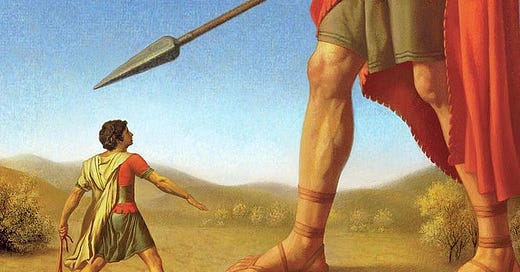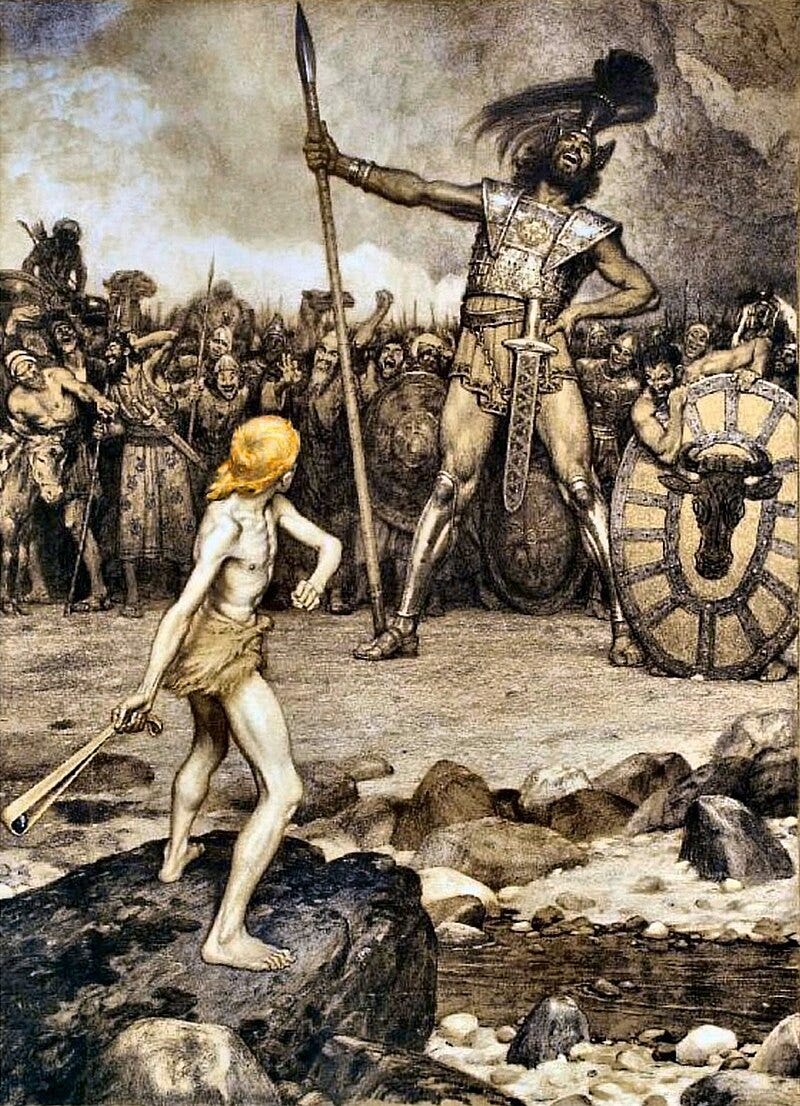Pauline Kael once said, “One of the surest signs of the Philistine is his reverence for the superior tastes of those who put him down.” That doesn’t seem to be a problem with the Philistine we’re reading about today, though.
Reading 1
1 Sm 17:32-33, 37, 40-51
David spoke to Saul: "Let your majesty not lose courage. I am at your service to go and fight this Philistine."
But Saul answered David, "You cannot go up against this Philistine and fight with him, for you are only a youth, while he has been a warrior from his youth."
David continued: "The LORD, who delivered me from the claws of the lion and the bear, will also keep me safe from the clutches of this Philistine."
Saul answered David, "Go! the LORD will be with you."
Then, staff in hand, David selected five smooth stones from the wadi and put them in the pocket of his shepherd's bag. With his sling also ready to hand, he approached the Philistine.
With his shield bearer marching before him, the Philistine also advanced closer and closer to David. When he had sized David up, and seen that he was youthful, and ruddy, and handsome in appearance, the Philistine held David in contempt. The Philistine said to David, "Am I a dog that you come against me with a staff?"
Then the Philistine cursed David by his gods and said to him, "Come here to me, and I will leave your flesh for the birds of the air and the beasts of the field."
David answered him: "You come against me with sword and spear and scimitar, but I come against you in the name of the LORD of hosts, the God of the armies of Israel that you have insulted. Today the LORD shall deliver you into my hand; I will strike you down and cut off your head. This very day I will leave your corpse and the corpses of the Philistine army for the birds of the air and the beasts of the field; thus the whole land shall learn that Israel has a God. All this multitude, too, shall learn that it is not by sword or spear that the LORD saves. For the battle is the LORD's and he shall deliver you into our hands."
The Philistine then moved to meet David at close quarters, while David ran quickly toward the battle line in the direction of the Philistine. David put his hand into the bag and took out a stone, hurled it with the sling, and struck the Philistine on the forehead. The stone embedded itself in his brow, and he fell prostrate on the ground. Thus David overcame the Philistine with sling and stone; he struck the Philistine mortally, and did it without a sword. Then David ran and stood over him; with the Philistine's own sword which he drew from its sheath he dispatched him and cut off his head.
This famous battle isn’t between David and Goliath; it’s between the God of Israelites and the gods of the Philistines. David promises to cut of Goliath’s head, and he’s not even carrying a sword! That’s how much faith he has in God.
We’re probably not going to face a giant today, but we still can bring faith in God to whatever challenges we do have.
Responsorial Psalm
Ps 144:1b, 2, 9-10
R. (1) Blessed be the Lord, my Rock!
Blessed be the LORD, my rock,
who trains my hands for battle, my fingers for war.
R. Blessed be the Lord, my Rock!
My refuge and my fortress,
my stronghold, my deliverer,
My shield, in whom I trust,
who subdues my people under me.
R. Blessed be the Lord, my Rock!
O God, I will sing a new song to you;
with a ten-stringed lyre I will chant your praise,
You who give victory to kings,
and deliver David, your servant from the evil sword.
R. Blessed be the Lord, my Rock!
It’s not often the psalms should be taken literally, but c’mon, David slew Goliath with a rock!
When God helps us slay giants, we should thank and praise him with this psalm.
Alleluia
See Mt 4:23
R. Alleluia, alleluia.
Jesus preached the Gospel of the Kingdom
and cured every disease among the people.
R. Alleluia, alleluia.
As king, Jesus welcomes all into His kingdom; as priest, he serves the people. He can do both, in his special position as both God and man, priest and king.
Gospel
Mk 3:1-6
Jesus entered the synagogue. There was a man there who had a withered hand. They watched Jesus closely to see if he would cure him on the sabbath so that they might accuse him. He said to the man with the withered hand, "Come up here before us."
Then he said to the Pharisees, "Is it lawful to do good on the sabbath rather than to do evil, to save life rather than to destroy it?" But they remained silent. Looking around at them with anger and grieved at their hardness of heart, Jesus said to the man, "Stretch out your hand." He stretched it out and his hand was restored. The Pharisees went out and immediately took counsel with the Herodians against him to put him to death.
Here’s a sequel to yesterday’s story. The Pharisees remember Jesus and the apostles plucking grain on Sabbath, so they’re keeping an eye on him this time.
Jesus is again ready for them. This time, He starts the conversation, asks them a question. Obviously, they have no answer. What are they going to say, “No, do evil?”
Jesus goes back to what he was doing, healing the man, knowing that it’s not going to endear him to the Pharisees. But he’s still sad about it. After all, the purpose of a miracle is not solely to benefit the person being healed, but to help the witnesses see God more clearly. But not everyone is willing to look with God’s eyes.




